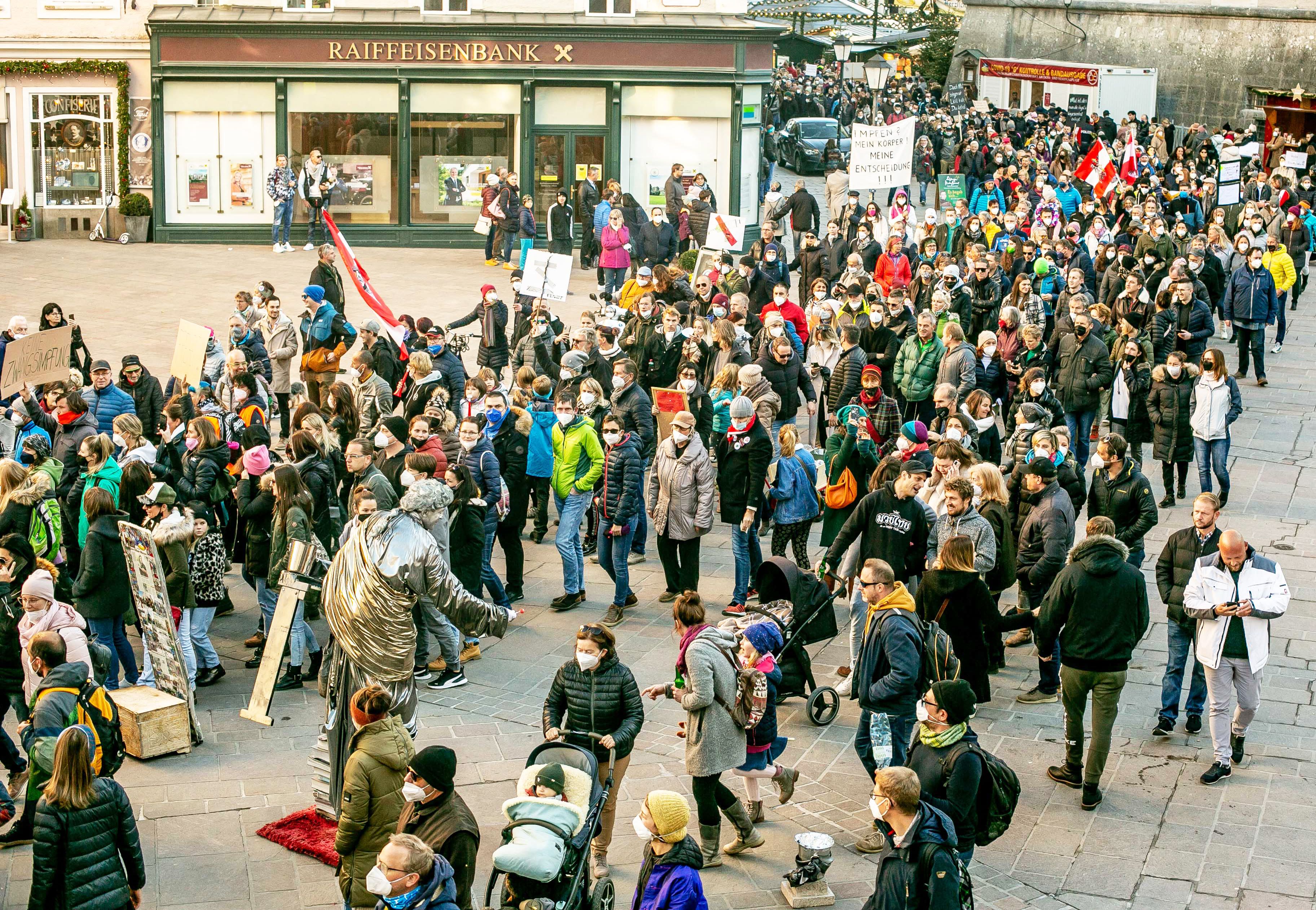
A demonstrator lights a smoke bomb during a rally held by Austria’s far-right Freedom Party FPOe against the measures taken to curb the Covid pandemic, at Maria Theresien Platz square in Vienna, Austria on November 20, 2021.
JOE KLAMAR | AFP | Getty Images
Protests against fresh Covid-19 restrictions have rocked Europe over the weekend, with demonstrations breaking out in places such as Brussels, Vienna, Rome and Amsterdam.
There were protests in Vienna on Sunday after Austria entered its fourth national lockdown due to the current pandemic wave, with people now being asked to work from home and non-essential shops closing.
More than 50,000 people staged a protest against the measures taken to stem the Covid-19 pandemic in Vienna, Austria, 20 November 2021.
Anadolu Agency | Anadolu Agency | Getty Images
Protesters gather in front of the Gare du Nord in Brussels on Nov.21. Police estimate 35,000 people gathered to protest against the Covid pass, which they consider to be divisive.
Thierry Monasse | Getty Images News | Getty Images
In Belgium, protesters clashed with police after tens of thousands of people gathered in a march through Brussels’ city center on Sunday. The “Protest for Freedom” march, primarily aimed at protesting against stricter Covid restrictions, was attended by around 35,000 people, the police estimated.
Meanwhile, demonstrations continued for a third day in the Netherlands, following violent scenes and dozens of arrests in Rotterdam, with thousands more gathering in Amsterdam over the weekend.
After Rotterdam’s riots, there was further trouble in various neighborhoods in The Hague on Saturday night, as well as reports of disorder in several other smaller Dutch towns.
People march during a protest against the latest measures to fight the Covid-19 pandemic, despite the cancellation of the event after violence marred protests in Rotterdam, on November 20, 2021 in Amsterdam.
EVERT ELZINGA | AFP | Getty Images
Over 50 people were arrested in Rotterdam on Friday after fierce demonstrations that were described as an “orgy of violence” by the city’s mayor.
Dutch police used water cannons and fired warning shots, injuring at least two people, after rioters against the country’s partial Covid lockdown — imposed amid surging cases — torched a police car, set off fireworks and hurled rocks at police officers.
This photograph taken on November 20, 2021 shows burned bikes after a protest against the partial lockdown and against the 2G government policy in Rotterdam.
JEFFREY GROENEWEG | AFP | Getty Images
Many Dutch people oppose the lockdown measures that have seen shops, bars and restaurants forced to close at 8 p.m.
Covid passes, which restrict access to venues like museums and bars to the vaccinated or recently recovered from Covid, are now compulsory in more venues. Protesters are opposed to government plans to make Covid passes mandatory in more sectors of public life. For now, tighter Covid measures are due to last until at least Dec. 4.
A sign protesting against Italy’s ‘Green Pass’ on November 20, 2021 in Rome.
Stefano Montesi – Corbis | Corbis News | Getty Images
Covid passes are also fueling protests in Rome, where large crowds gathered this weekend, objecting to the enforcement of Italy’s version of the Covid passport, the “Green Pass,” which became mandatory for all Italian workers on Oct. 15.
Workers must either show proof of vaccination, a negative test or recent recovery from infection or they could be suspended from work without pay or face a fine.
People protest during a demonstration organized by ‘No Green Pass’ and ‘No Vax’ movements against the Green Pass Covid-19 health certificate, at the Circo Massimo in Rome on November 20, 2021.
Stefano Montesi – Corbis | Corbis News | Getty Images
Thousands of people also marched in Croatia’s capital Zagreb on Saturday, demonstrating against mandatory vaccinations for public sector workers and Covid passes.
Thousands of people stage a protest against Covid-19 measures in Zagreb, Croatia on 20 November 2021.
Anadolu Agency | Anadolu Agency | Getty Images
In Germany, politicians are beginning to debate the need for mandatory vaccinations, a move which could prompt protests if implemented.
The country’s seven-day coronavirus incidence rate has hit record highs in the past two weeks, while only around 69% of the population is fully vaccinated.
Read more: Germany announces new Covid restrictions for the unvaccinated as infection rate hits record
The government imposed nationwide restrictions against the unvaccinated last week, but lawmakers from across the political spectrum have said stricter rules may be needed.



